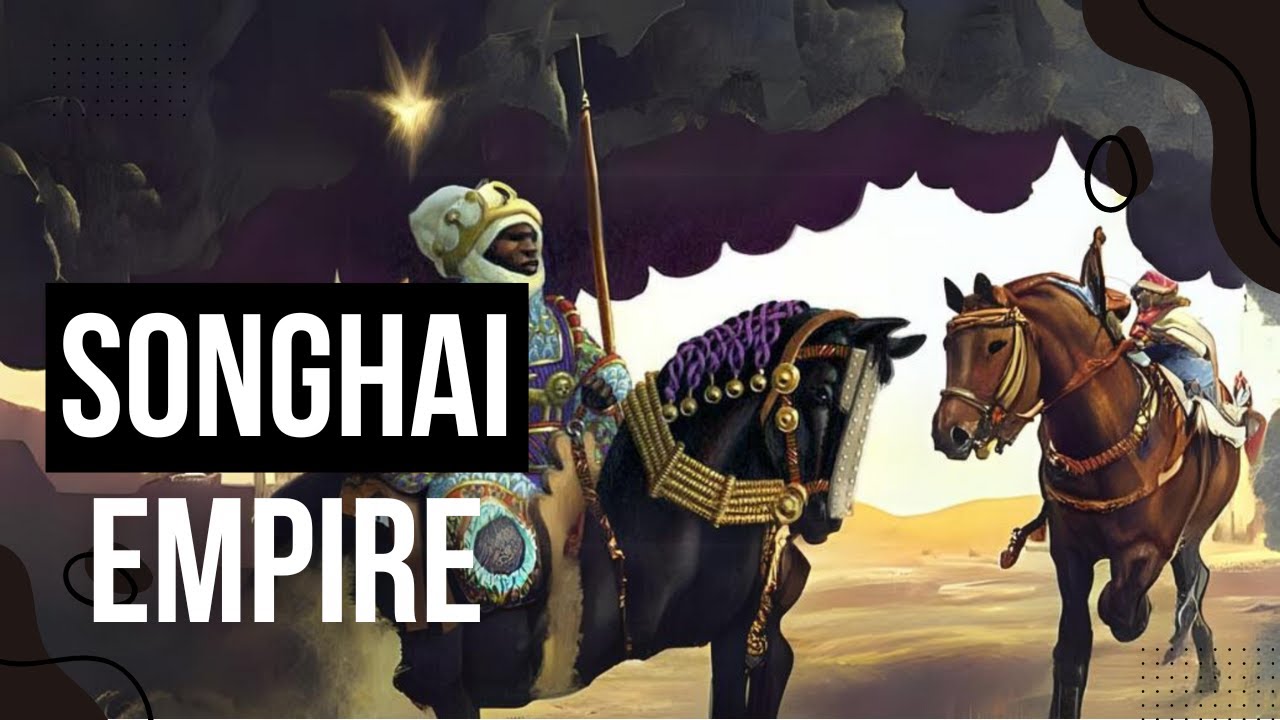West African Kingdoms of Ghana, Mali & Songhai
Summary
TLDRThis script delves into the rich history of West Africa, focusing on the Mali and Songhai Empires from the 13th to the 16th centuries. Highlighting legendary figures like Sundiata Keita and Mansa Musa, it showcases their military prowess, cultural achievements, and economic influence through gold and trans-Saharan trade. The script also touches on the empires' architectural marvels, Islamic scholarship, and the intriguing tale of Abu Bakar II's possible voyage to America, reflecting the region's complex and vibrant past.
Takeaways
- 🎶 The djembe and delune drums of Mali are symbolic of the historical significance of the region, heralding the arrival of kings and warriors who dominated West Africa from the 13th century for over 300 years.
- 🏰 The Mali Empire and the Songhai Empire were renowned for their cultural richness and were admired across the world, with famous figures like Sundiata Keita, Mansa Musa, and Askia Mohammed playing pivotal roles in their development.
- 📚 Timbuktu was a center of scholarship, housing one of the world's largest universities and becoming a hub for Islamic learning and intellectual pursuits.
- 🛶 The Mali Empire's wealth was significantly based on trans-Saharan trade, with gold, millet, sorghum, and slaves being key commodities, and the Tuareg people playing a crucial role as nomadic traders.
- 💎 Mansa Musa's pilgrimage to Mecca in 1325 demonstrated the empire's wealth, as he spent lavishly and influenced the economy of Egypt, leading to a temporary devaluation of gold.
- 🛣️ The empires of Mali and Songhai were characterized by their vast territories and elaborate political power structures, with the Songhai Empire eventually eclipsing Mali in size and influence.
- 🌍 There are historical claims and debates about African explorers, possibly including Abu Bakar II, reaching the Americas before Columbus, suggesting early transoceanic trade links between Africa and the Americas.
- 🕌 The spread of Islam was a significant factor in the cultural and religious transformation of the Mali Empire, with leaders like Mansa Musa and Askia Mohammed promoting its adoption and practice.
- 📖 The University of Timbuktu was a major center for the production of books and intellectual exchange, with relationships with other learning centers across the Islamic world.
- 📜 The preservation of ancient manuscripts in private collections, such as that of Abdul Qader Mama, highlights the ongoing importance of safeguarding historical knowledge and cultural heritage.
- 🗽 The Songhai Empire's legacy of social cohesion, political stability, and scholarly achievement contributed to its respect and influence in West Africa until its decline in the late 16th century.
Q & A
What is the historical significance of the djembe and delune drums in Mali?
-The djembe and delune drums of Mali are significant as they herald the arrival of kings and warriors who dominated West Africa from the 13th century for over 300 years, symbolizing the beginning of the Mali and Songhai empires.
Who were the prominent kings of the Mali and Songhai empires?
-The prominent kings of the Mali and Songhai empires included Sundiata Keita, Mansa Musa, Abu Bakar II, and Askia Mohammed.
What was the economic foundation of the Ghana Empire?
-The Ghana Empire's economy was based mainly on gold, millet, sorghum, and slaves, trading with nomadic Tuareg and other Saharan merchants for salt, textiles, and exotic goods.
How did Sundiata Keita play a role in the Mali Empire's expansion?
-Sundiata Keita, after a series of battles and strategic maneuvers, managed to recover territory from the old Ghana Empire and extend the boundaries of his empire, forming alliances and securing the allegiance of many kings.
What was the role of trans-Saharan trade in the Mali Empire's economy?
-Trans-Saharan trade was crucial to the Mali Empire's economy, with merchants known as doulas controlling caravans that traded across the Sahara, exchanging gold for goods like salt and textiles.
What cultural changes did Islam bring to the Mali Empire?
-Islam brought significant cultural changes to the Mali Empire, including the adoption of Islamic practices and the construction of mosques and other buildings in the Sudanese style.
What is the significance of Mansa Musa's pilgrimage to Mecca in 1325?
-Mansa Musa's pilgrimage to Mecca in 1325 is significant because he brought a large amount of gold, which affected the economy of Egypt and showcased the wealth of the Mali Empire.
What is the historical controversy surrounding Abu Bakar II's voyage across the Atlantic?
-The historical controversy surrounding Abu Bakar II's voyage is whether he was the first to cross the Atlantic Ocean before Columbus, potentially establishing trade links with the Americas.
How did Askia Mohammed contribute to the Songhai Empire's development?
-Askia Mohammed contributed to the Songhai Empire's development by promoting universities and centers of learning, establishing Islam as the state religion, and encouraging the production of printed material.
What was the fate of the Songhai Empire?
-The Songhai Empire lasted until around 1590 when it succumbed to invasion by the Moroccan army, which sought to expand their own empire.
What is the importance of the Sankore Mosque in Timbuktu?
-The Sankore Mosque in Timbuktu was an important center for Islamic scholarship and education, serving as a university with connections to other learning institutions across the Islamic world.
Outlines

此内容仅限付费用户访问。 请升级后访问。
立即升级Mindmap

此内容仅限付费用户访问。 请升级后访问。
立即升级Keywords

此内容仅限付费用户访问。 请升级后访问。
立即升级Highlights

此内容仅限付费用户访问。 请升级后访问。
立即升级Transcripts

此内容仅限付费用户访问。 请升级后访问。
立即升级5.0 / 5 (0 votes)






